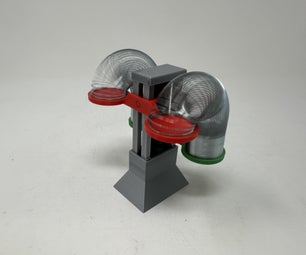Introduction: Week 4 Part A: Shape Optimized Hook
I designed a shape-optimized hook in Fusion 360 by following the MAT 238 parametric modeling and topology optimization tutorials. Due to time and space considerations, this design was not 3D-printed. Please visit Week 4 Part B of my Instructables to see the generative toolbox that I both designed and 3D-printed.
Step 1: Design Initial Hook
I followed the parametric modeling tutorial to design my initial hook, but I chose to design my hook with 4 holes rather than the 6 used. I also changed the dimensions of the hook, but it still fit within the 100 mm x 100 mm x 120 mm size requirement.
Step 2: Evaluate Initial Hook
Once I finished my initial hook design, I ran my first shape optimization by following the topology optimization tutorial. Unlike the tutorial, my holes were all connected to the rest of the model, so I only had to adjust the geometry of the hook to optimize its performance, as the outward part — in bright red — would be talking a lot of force without much support.
Step 3: Optimize Hook
I improved my hook design by increasing the height of the outward part and adding a stronger base, and when I ran another shape optimization test, my hook appeared to perform better than it would have had I not updated my design.
Step 4: Slice Hook
I was happy with my final hook design, so I sliced it for the Prusia i3 MK3/MK3s printer in UltiMaker Cura.
Step 5: Final Model
This is an image of the final 3D shape-optimized hook model!
Step 6: Key Insights and Reflections
I learned that shape optimization can improve the performance of an artifact, which can help me design future artifacts more efficiently (rather than printing every single design and testing them physically). I would have liked to test how sturdy my final hook was in comparison to my initial hook to see how beneficial the shape optimization was.















